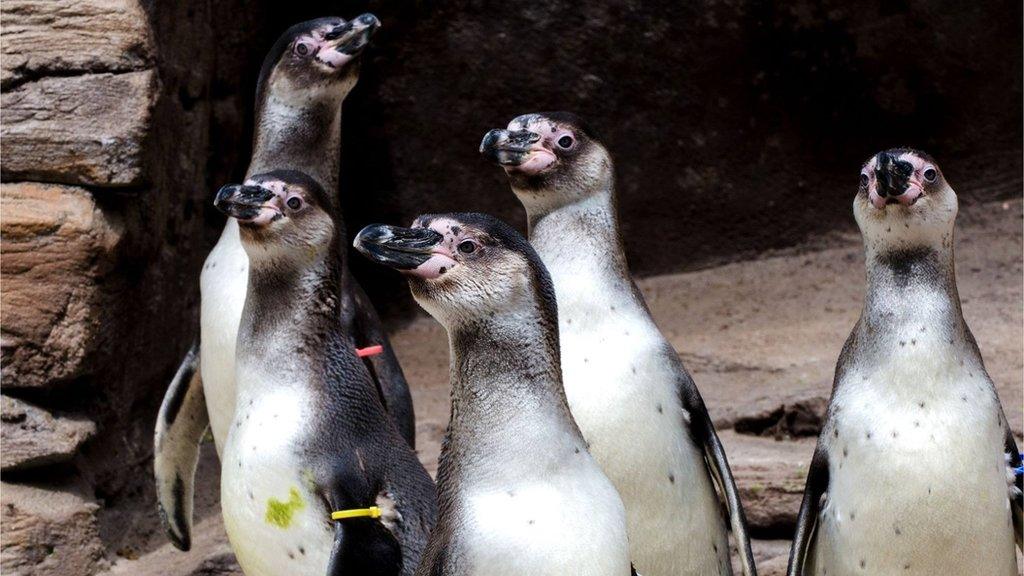What the death of Dory the penguin says about India's zoos
- Published
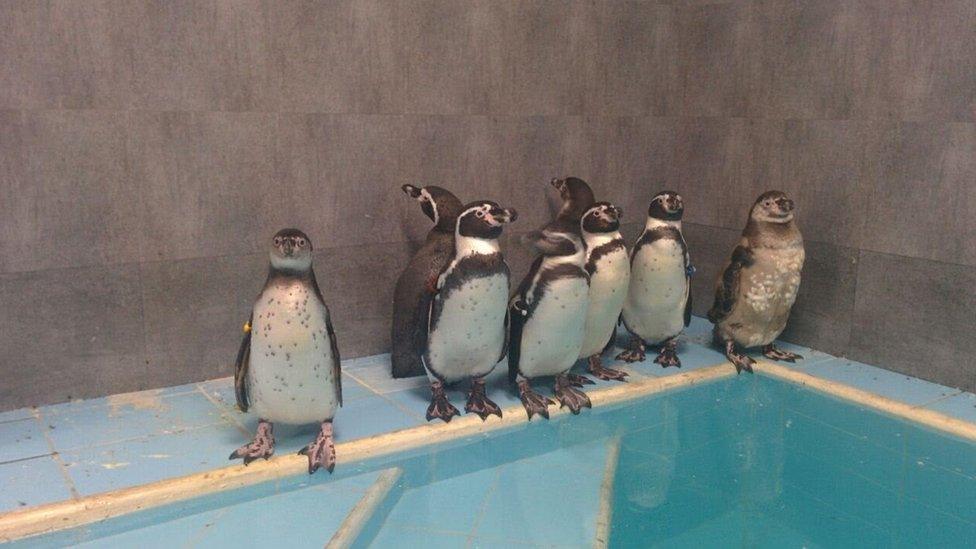
The eight birds were bought from an aquarium in Seoul
In July, Mumbai's main zoo welcomed a waddle of living penguins - the first to be displayed in India in nearly two decades - to spruce up its flagging image. But last month, one of them, affectionately named Dory, died of a bacterial infection.
"The death of Dory was an unfortunate incident," zoo director Dr Sanjay Tripathi told me. "The upkeep of penguins here is being done according to international standards."
Many are not convinced. The 143-year-old zoo, spread over three acres and home to 400 animals, is one of India's oldest, and most shambolic, parks.
Animals saunter listlessly in grubby enclosures. A crocodile suns itself in algae-covered water. Outside, the leafy walkways overflow with canoodling couples. In tiny, unkempt parks, children play on rotting swings and jungle gyms. Gaudily painted penguin-shaped litter bins complete a slovenly landscape.
One grim report, external says more than 160 birds and animals died here between 2010 and 2011 alone.

You might also like:

In January 2006, a stampede of blackbuck at the zoo resulted in the deaths of 13 animals, external. A 2003 report by a non-profit organisation Zoocheck Canada recommended the zoo should be shut down. "It was a shameful reminder of what zoos continue to do in the name of conservation and education," said Shubhobroto Ghosh, one of the inspectors and author of the Indian Zoo Inquiry, external.
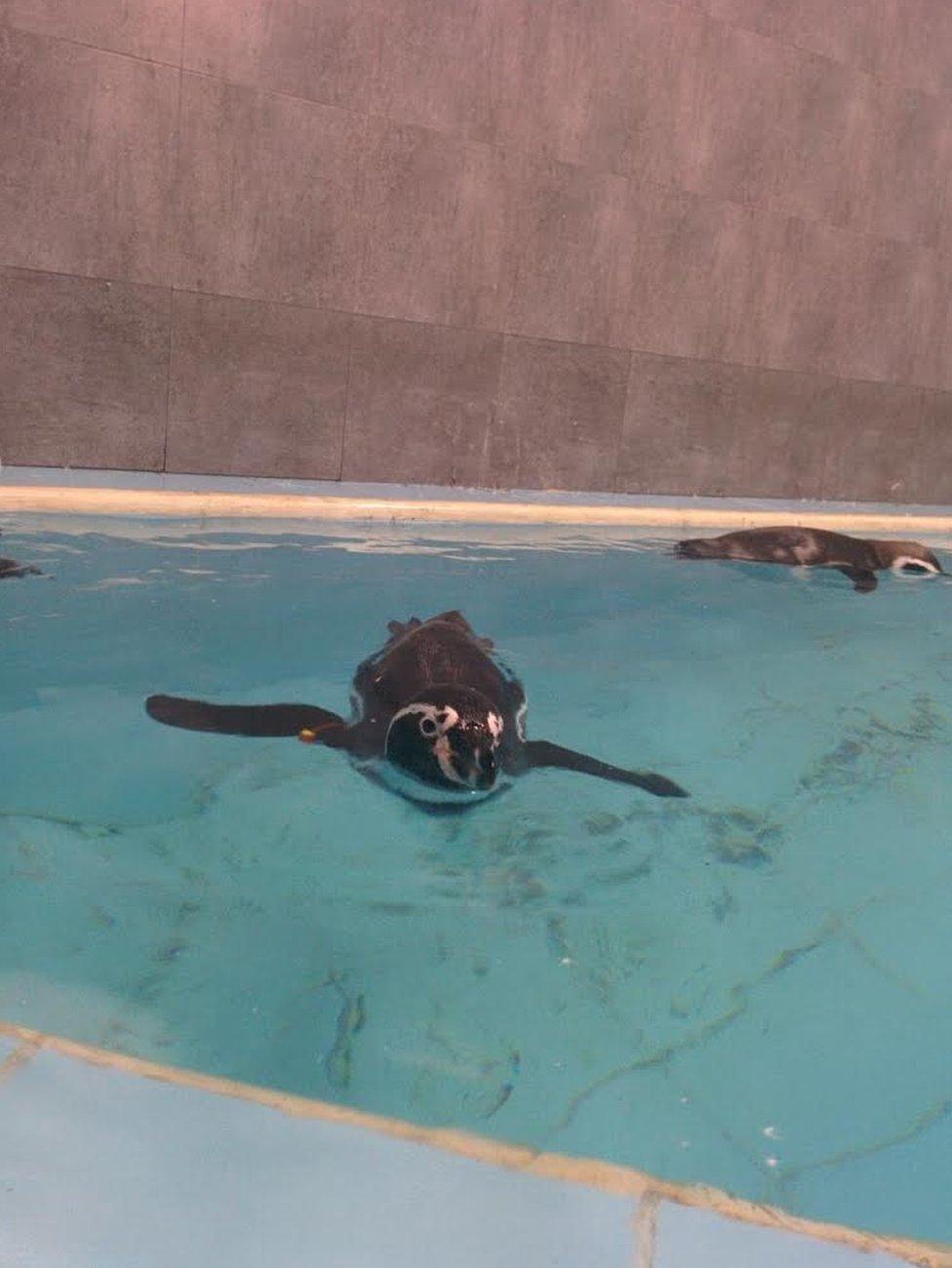
The penguins have been kept in quarantine in the Mumbai zoo
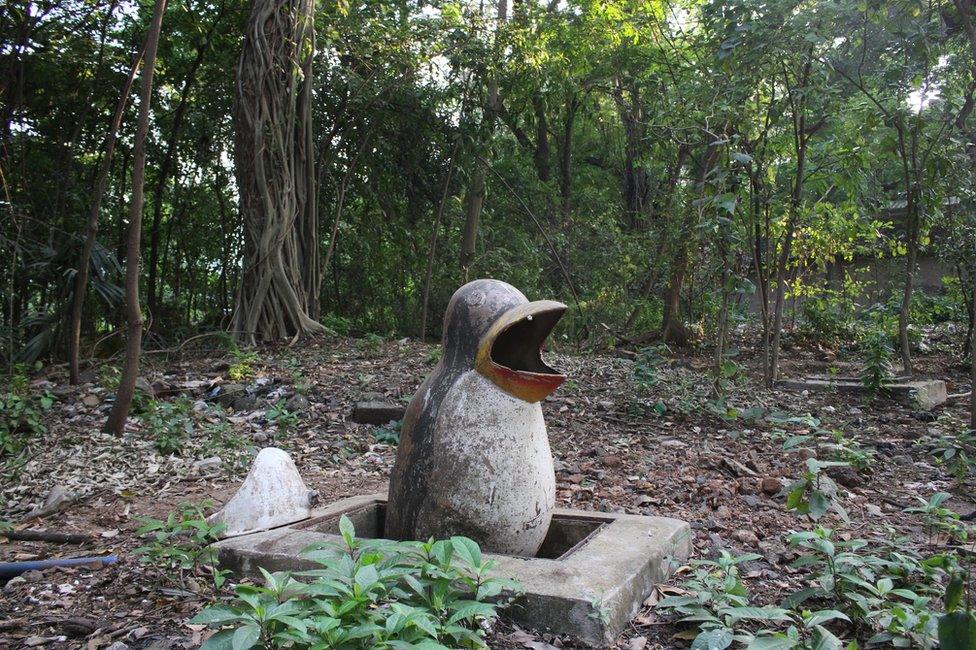
Penguin-shaped litter bins dot the Mumbai zoo
But prompted by an enthusiastic local politician, authorities went ahead and procured eight penguins aged between one and three - from a private aquarium in Seoul. Their purchase, upkeep for five years, and a special enclosure, will cost Mumbai's taxpayers $2.5m (£2.08m).
Mumbai zoo director Dr Tripathi believes critics are panicking too much.
Worst fears
For one thing, officials say the penguins belong to the Humboldt, external species. Originally from South America, these penguins are normally found around coastal areas of Peru and Chile.
They are intrepid swimmers and breed and survive in higher temperatures than, say, some of the more famous Antarctic penguins. But Humboldt penguins are also officially listed as "vulnerable", external by the International Union for Conservation of Nature, which means they are at immediate or imminent risk of becoming endangered.
More than 120 countries, including 21 in Asia, display some 15,000 Humboldt penguins in captivity. (There are estimated to be some 24,000 of these penguins in the wild.) Unlike the Antarctic penguins, which can survive in temperatures of -40C, the Humboldts can thrive in captivity in temperatures ranging between 12C-20C, officials say.
Since their arrival on 26 July, the birds have been kept in quarantine in a 200 sq ft (18.5 sq m) room with a small 2m-deep pool, where six three-tonne air-conditioners and a number of freezers are helping maintain temperatures between 16C-18C. They are being fed a lot of fish.
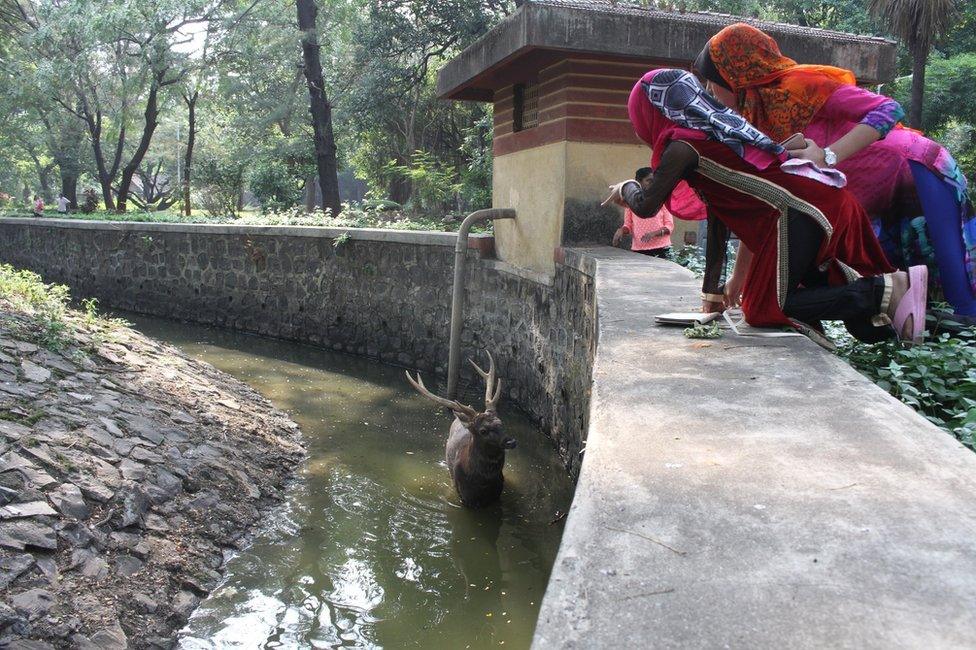
The zoo in Mumbai is home to about 400 animals
Next month, if things go according to plan, the penguins will be shifted to a climate-controlled 1,800 sq ft (167 sq m) enclosure in a brand new three-storey building in the park.
Penguins are hardy birds and can survive some of Earth's most extreme conditions. So what happened to Dory?
Doctors say on 18 October, she became dull, lost her appetite, had laboured breathing, and an upset tummy. She did not respond to treatment and died five days later.
Dory's death has triggered outrage among animal lovers and environmentalists who say their worst fears have come true.
They have questioned the wisdom of importing penguins - who need controlled environments to survive in captivity - into a city with erratic water supply and scarce local expertise to look after them.
There have been allegations about the credentials of a private contractor entrusted with the upkeep of the birds. The authorities have denied the charges.
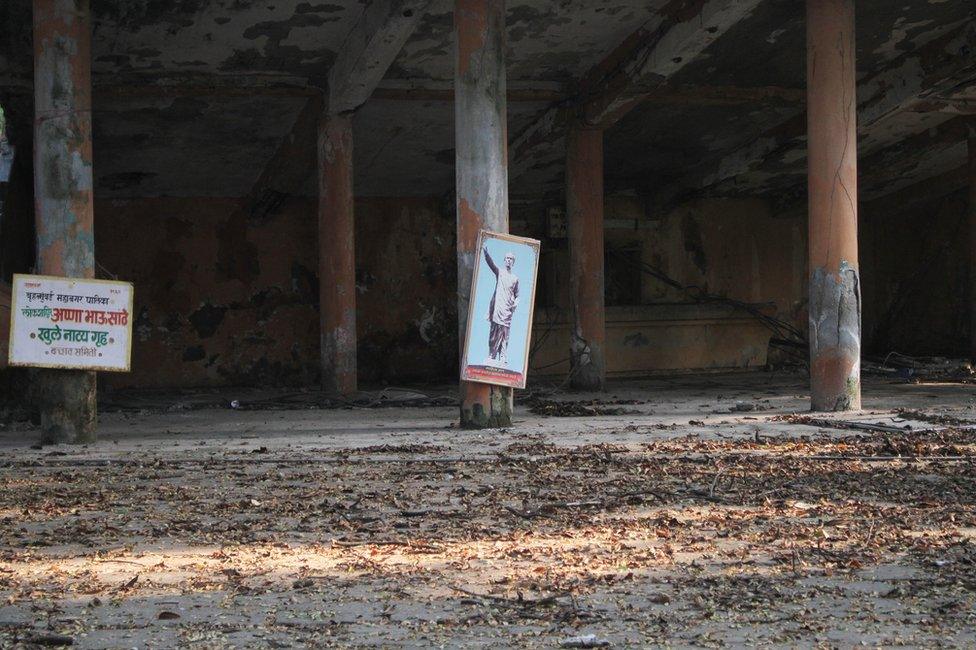
Much of the zoo is in a sorry state
As with most things in India, the death also sparked a political row , externalwhich bordered on the farcical. Opposition politicians demanded a condolence meeting to mourn Dory's death, others wanted lemon and chillies hung near the quarantine room to ward off bad luck, external.
Penguin deaths are not uncommon around the world. In September, 10 birds died at Devon's Exmoor Zoo over the course of two weeks. Avian malaria was a suspected cause, although the post mortems proved inconclusive.
But it is certainly true that India does urgently need to renovate most of its dismal zoological parks, and look after the animals in captivity better.
'Make it rewarding'
Even the government admits this. "In India, many well-designed zoos were set up in some of the states, but for the most part, zoos have not been able to meet the challenges imposed by the changing scenario and still continue with the legacy of the past - displaying animals under conditions which are neither congenial to the animals nor educative and rewarding to the visitors," says a Central Zoo Authority 2014 report, external.
The story so far of the Mumbai penguins also mirrors what many believe is a mismatch between grandiose aspirations and modest capacities. It also shows the perils of policies drafted around the whimsies of politicians.
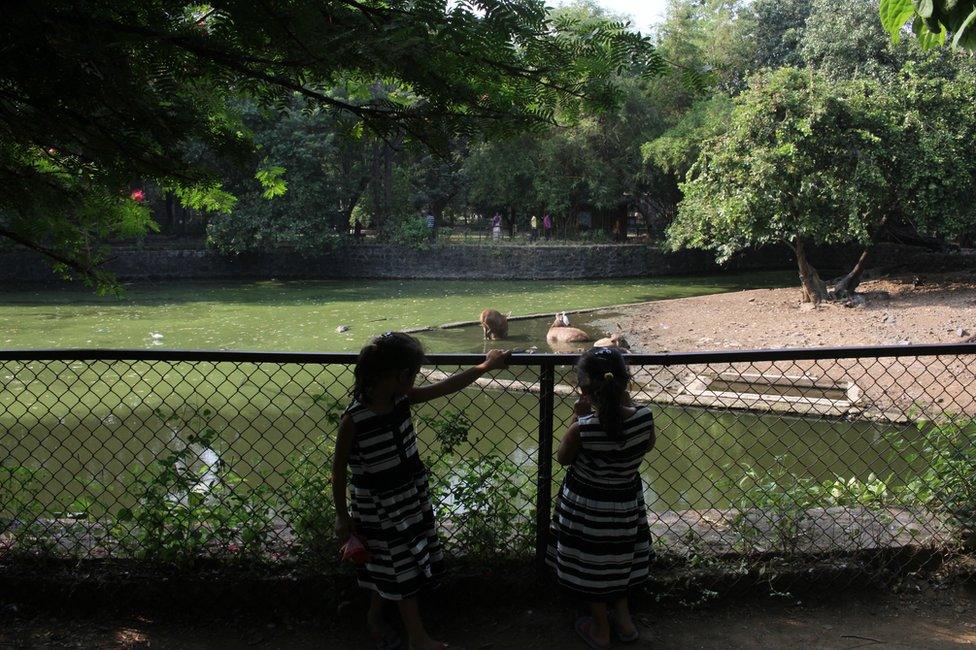
The zoo in Byculla is one of the oldest in India
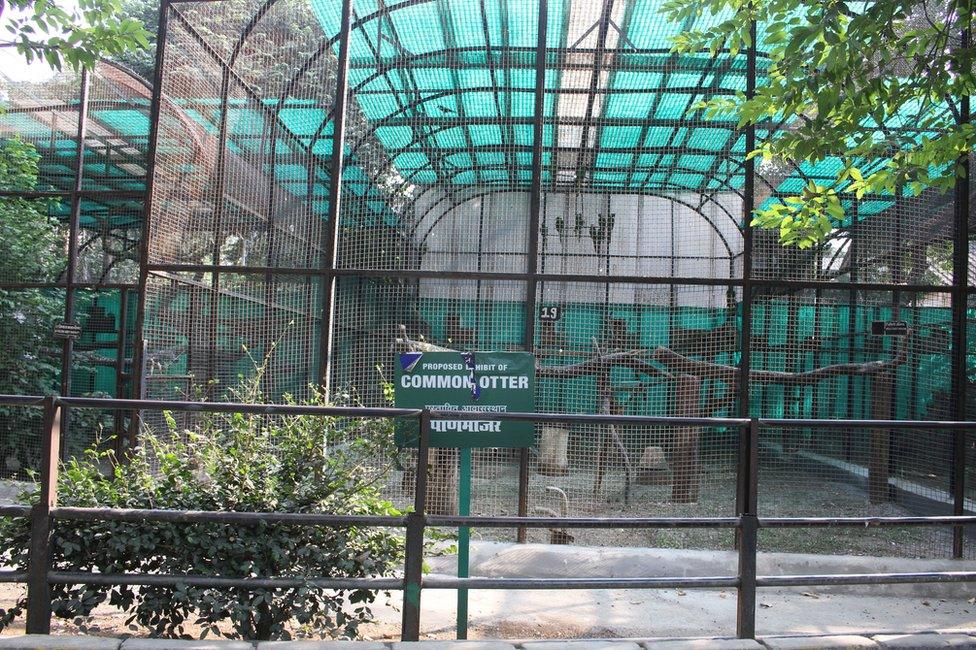
The zoo is getting a badly needed makeover
After penguins, there's even a bold plan to develop an "African savannah", with zebras and giraffes on a seven-acre plot in the same zoo. It would be sobering to look at the travails of a lion safari , externalplanned in the northern state of Uttar Pradesh, a pet project of a ruling regional politician: five lions, including two cubs, have already died.
Then there are other questions. "Is it worth spending so much money on procuring penguins when most of our zoos are cash-strapped and you are not able to look after what you already have?" wonders wildlife expert Aniruddha Mookerjee. "Also, how many Indians are really dying to see Humboldt penguins?"
The Byculla zoo is expected to get a $25m (£24m) makeover in the coming years. That is good news. For the moment, authorities are depending on faith to keep Mumbai's penguins alive.
"We should now pray," says zoo director Dr Tripathi, "that the other penguins survive."
- Published19 October 2016
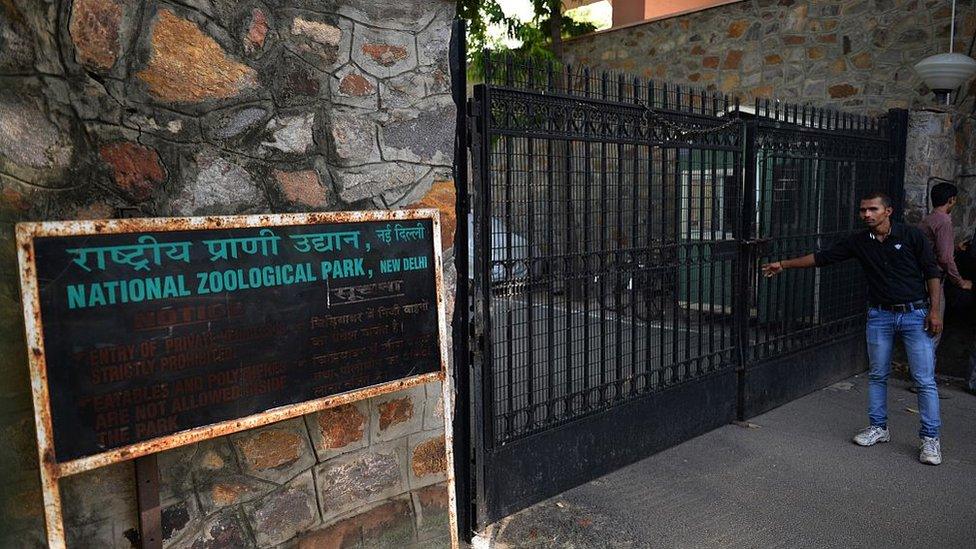
- Published27 September 2016
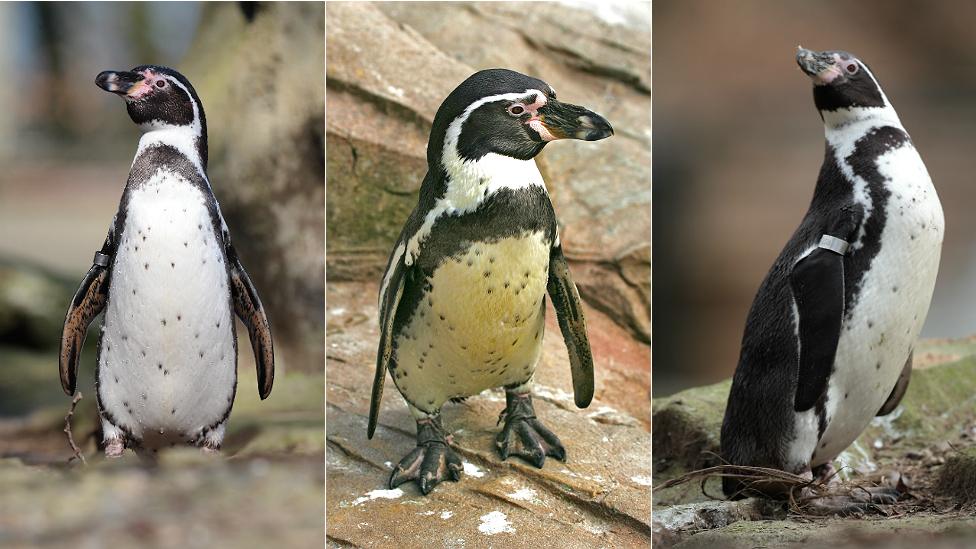
- Published21 September 2016
